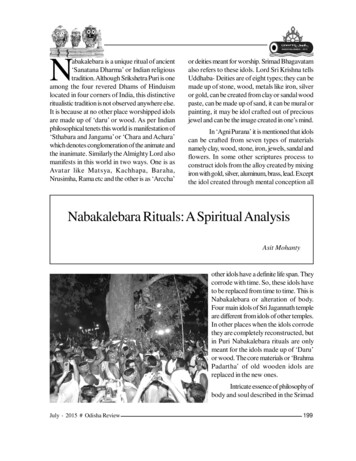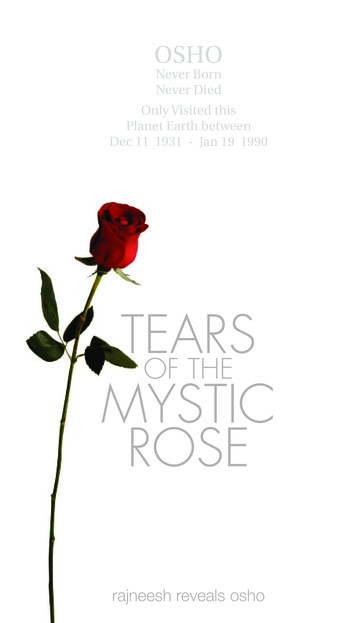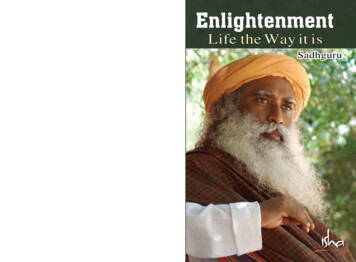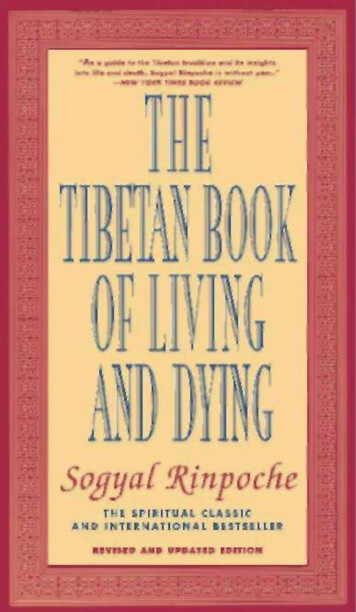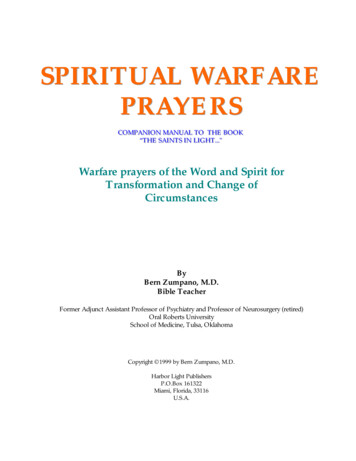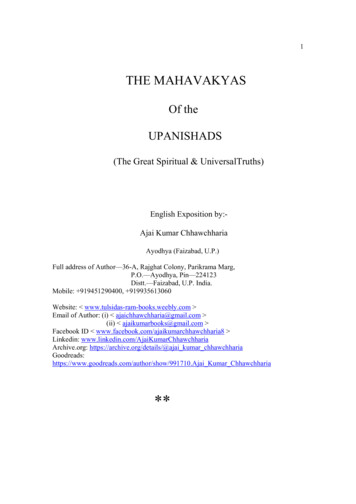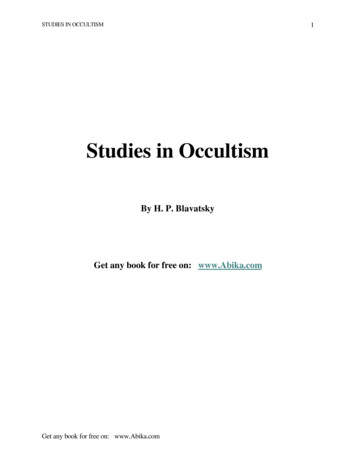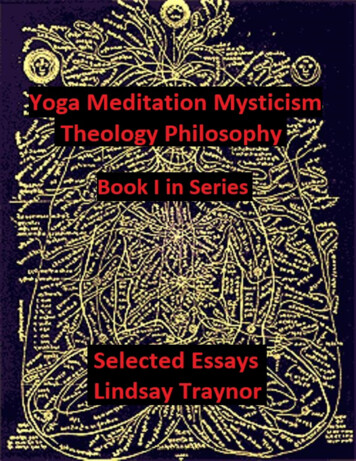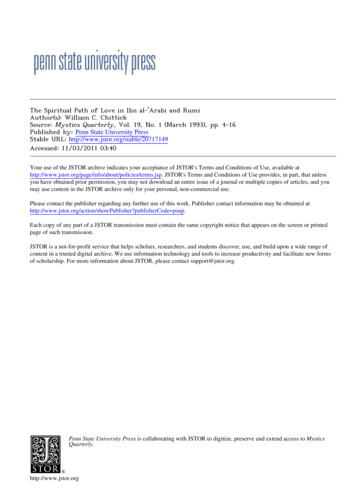
Transcription
The Spiritual Path of Love in Ibn al-'Arabi and RumiAuthor(s): William C. ChittickSource: Mystics Quarterly, Vol. 19, No. 1 (March 1993), pp. 4-16Published by: Penn State University PressStable URL: http://www.jstor.org/stable/20717149 .Accessed: 11/03/2011 03:40Your use of the JSTOR archive indicates your acceptance of JSTOR's Terms and Conditions of Use, available at ms.jsp. JSTOR's Terms and Conditions of Use provides, in part, that unlessyou have obtained prior permission, you may not download an entire issue of a journal or multiple copies of articles, and youmay use content in the JSTOR archive only for your personal, non-commercial use.Please contact the publisher regarding any further use of this work. Publisher contact information may be obtained at erCode psup. .Each copy of any part of a JSTOR transmission must contain the same copyright notice that appears on the screen or printedpage of such transmission.JSTOR is a not-for-profit service that helps scholars, researchers, and students discover, use, and build upon a wide range ofcontent in a trusted digital archive. We use information technology and tools to increase productivity and facilitate new formsof scholarship. For more information about JSTOR, please contact support@jstor.org.Penn State University Press is collaborating with JSTOR to digitize, preserve and extend access to MysticsQuarterly.http://www.jstor.org
The Spiritual Path of Love inIhn al-Arabi and RumiThe paths whereby Muslims approach God can be classified under threebroad headings: knowledge, activity, and love. In one respect, knowledgeprecedes the other two paths, because Islam, in contrast to certain otherreligions, places primary stress on understanding the nature of things. It issufficient to remember that Islam begins with a statement or a "witnessing"(shahada) which, forMuslims, is a self-evident fact,not a belief: "There isnogod but God," or, in otherwords, "There is nothing truly real but the absolutely Real."1 In another respect, activity takes pride of place, becauseknowledge tends to become the domain of a relatively small number ofpeople, while allMuslims without exception are expected to observe the"Shariah." This is thename given to thedetailed guidelines for activity as setdown in themessage brought fromGod byMuhammad-thatis, theKoranas well as inMuhammad's "S?nna," his custom orwont, or theway inwhichhe put theKoranic message intopractice. As for love, the later tradition seesitboth as God's underlying motivation for creating the universe and as theinternalhuman response toGod's love for creation. By following the path oflove, human beings complete God's creative act.Although the Islamic tradition recognizes thatGod can be approachedthrough knowledge, activity, and love, it rarely considers the three paths asseparate from each other. Islamic thinking is fundamentally unitary and unitive.Certain authorities and schools may stress one of these approaches overthe other two, but, by and large, they take all three into account. Hence, byspeaking here about the "path of love in Ibn al-'Arabi and Rumi," I do notmean to suggest that these two authors neglected the paths of knowledge oractivity. Indeed, in the case of Ibn al-'Arabi, one can make a strong case forgiving knowledge priority over the other two paths.For themost part, love is not stressed in early expressions of Islamic spirituality.However, theKoran speaks of love in a number of key verses thatmake clear its fundamental role. For example, God addresses Muhammadin theKoran with thewords, "Say [to the people]: 'Ifyou loveGod, followme, and God will love you'" (3:31). In otherwords, thosewho loveGod mustrecognize theKoran as God's message and follow its practical and active4
embodiment provided byMuhammad's example. Thereby theywill demonstrate their love forGod, and God in turnwill love them.But all lovers in Islamic history have recognized that the primarymotivepower thatbrings about love between God and human beings is not humanlove, but divine love, or the grace thatGod gives bywhich people are able tothe authorities read the followingKoranic verse as estabthebasiclishinghierarchy of love: "He loves them, and they love Him"Godloves human beings, then human beings loveGod.First(5:54).Early expressions of Islamic spirituality,whether or not love is stressed,tend to take the form of prayers and supplications or pithy sayings.2 Butfrom the eleventh to the thirteenth centuries-the fifth to the seventhlove him. HenceIslamic centuries-a number of extremely important authors appear whomap out a detailed spiritual psychology of love.The famousMuhammad alGhazali (d. a.h. 505/a.d. 1111) sometimes writes about human and divinelove, but his less well-known brother, Ahmad Ghazali(d. 520/1126),devotes most of his relatively short Persian work, Sawanih, to love as theunderlying, unitive reality of the soul, and thiswork then provides inspiration for dozens of later treatises in Persian and other Islamic languages.3Ahmad's disciple 'Ayn al-Qudat Hamadani (d. 525/1131) plays an importantrole in formulating a psychology andmetaphysics of love. Perhaps most profound and original in approach-in a period ofmany great masters-wasAhmad Sam'ani (d. 534/1140), even though he has remained almost completely unknown tomodern scholars. The recentpublication of his 600-pagePersian commentary on the divine names has shown thathe rankswith thegreatest authorities of Islamic history in the exposition of love'smysteries.4Ibn al-'Arabi and Rumi can be considered the greatestmasters of the tradition ofwriting on divine and human love. Ibn al-'Arabi,who wrote prolificallyin Arabic, is Islam's foremost mystical theologian and philosopher.5 Hecomposed more than 500 prose works, some of them of enormous length,along with tens of thousands of verses of poetry. He was born inMurcia inpresent-day Spain and died inDamascus in 638/1240. His younger contemporary, Jala al-Din Rumi, was born inBalkh inpresent-dayAfghanistan andmoved inhis youth toKonya (now inTurkey), where he died in 672/1273.6He composed about 65,000 verses of breathtaking Persian poetry along witha number of shortprose works. The Persianate world, fromTurkey to India,looks back on Rumi as the greatest spiritual poet ofhistory, just as thewholeIslamic world considers Ibn al-'Arabi the greatest theoretician of Sufism,that is, themystical and spiritual dimension of Islam.7Ibn al-'Arabi and Rumi belong to two differentcurrents of Islamic spirituality. Each in his own way marks the high point of a tradition.Most formulations of Islamic spiritual teachings after them are guided by theirwrit5
ings.One can differentiate theperspectives of the two authors inmany ways,but one can also look at the common elements, an especially easy taskwhenconsidering the question of love.8 In what follows, I will illustrate how Ibnal-'Arabi explains certain dimensions of love's reality and, at the same time,offera few appropriate examples ofRumi's poetical expressions of the sameor similar themes.Love'sCreativityLove cannot be defined, though its effects and consequences can bedescribed. On this point Ibn al-'Arabi the theoretician and Rumi the poetagree completely:Love has no definitionthroughwhich its essence can be known.Rather, it isgiven descriptiveand verbal definitions,nothingmore. He who defines lovehasnot known it,hewho has not tasteditby drinkingitdown has not known it,andhewho says thathe has been quenched by ithas notknown it,for love isdrinkingwithout quenching. (FutuhatII 111.2; cf. II 325.10)asked, "What is loverhood?"I replied, "Don't ask about these meaningsSomeone"When you become likeme, you'll know;When itcalls you, you'll tell its tale." (Diwan 29050-51)In the broadest sense, love can be called themotive force forGod's creativthe prophetity.According to a famous saying attributed toMuhammad,createtheworld?" God replied, "I was aDavid asked God, "Why did youhidden treasure and I loved tobe known. Hence I created the creatures that Imight be known." In one of his many commentaries on this saying, Ibnal-'Arabi tells us that the kind of knowledge thatGod loved to achievethrough creation was originated in time, since God already knew himselfand all things in eternity:God "loved tobe known." In accordancewith lovefor the things,he turnedhisdesire towardthemwhile theywere in the stateofnonexistence.They were theroot [ofcreation]throughthepreparednessof theirpossibility.He said to them,"Be!", and theycame tobe, thathemight be knownby everysortofknowledge.Knowledge originatedin timeas yethad no object, since theonewho knows bymeans of itwas not yet qualifiedby existence.9Arabi explains themeaning ofGod's love tobeIn another passage, Ibn al-cknown while commenting on theKoranic verse, "And He iswith you wher6
ever you are" (57:4). Love is a name given toGod's attribute of neverlettingthe creatures out of his sight and always being concerned for theirwelfare:God's love forthecreaturesis attributedto themin relationto theirbeing.He iswith themwherever theyare,whether theyexist [in thecosmos]or not. Justas heiswith themin the stateof theirexistence,so also he iswith themin the stateoftheirnonexistence,since theyare objects of his knowledge.He witnesses themand he loves themforall eternity,because no propertycomes over him thathehe always loveshis creatures,justas hedid not alreadypossess.On thecontrary,alwaysknows them.His words, "I loved tobe known,"giveus knowledgeof thesituationas it is in itself.Though thisworld is finite,the thingsengenderedwithin itare evernew, andtheirengenderinghas no end, since thepossibilitieshave no end.The possiblethingsneverhad a beginningwithGod, justas theirendlessness is fixedand necessarywithGod. His Being has no beginning,so his loveforhis servantshas nobeginning. (FutuhatII 329)Rumi often alludes to theHidden Treasure. He points out thathuman beingsmust imitateGod because of the treasures of divine potentiality that areconcealed within their selves:God created theuniverse formanifestation,lest the treasureofwisdom stayhidden.He said, "I was a hidden treasure."Listen!Losenot yoursubstance!Makeyourself manifest!10In one of his prose works, Rumi explains the significance of theHiddenTreasure in some detail:Godsays, "I wasa hiddentreasureand I lovedto be known."In other words,"Icreated thewhole cosmos, and thegoal inall of itwas tomake myselfmanifest,sometimesthroughgentlenessand sometimesthroughseverity."God isnot thekindof king forwhom a singleheraldwould be sufficient.Were all theatomsoftheuniversehis heralds, theywould fall shortand be incapableofmaking himknown.11Rumi epitomizes the idea ofGod's creative love by comparing theworld toa mirror inwhich the beauty of love isdisplayed:God said to love, "Were itnot foryour beauty,would I concernmyselfwith themirror of existence? (Diwan 26108)Rumi frequently points to love as the fundamental motive for creation by"But for thee, Icommenting on a divine saying addressed toMuhammad:7
not have created the heavenly spheres." Here the Prophet-whorepresents theperfection of thehuman state ispictured as theultimate goalof creation, since only through human beings, created inGod's image, is awouldfull and complete knowledge of God made possible on the created level.Through them alone can theHidden Treasure be completely known:Love makes theocean a boiling pot,love grindsdown mountainslove shakesthe earth withto sand.Love splits theheavenswith a hundred splittings,its outbursts.Pure lovewas pairedwithMuhammad,for its sake Godsaidto him,"Butfor thee. .":"Were itnot forpure love,why would I create the spheres?I raised thecelestialwheel on highso thatyoumight grasp love's exalted rank."(MathnawiV 2735-37, 39-40)Love for theTrue BelovedGod created theworld through love, so love brings about separation, distinction, and multiplicity. It is the origin of all movement and change.Within the created order, love keeps theuniverse in a constant state of transformation and flux, and because of love, theworld subsists. As Rumi putsit,Thecreaturesare set in motionby love,without beginning.loveby eternityThe wind dances because of the spheres,the treesbecause of thewind. (Diwan 26108)God's wisdom throughhis destiny and decreemadeuslovers of one another.That foreordainmentpaired all parts of theworldand set each of them in love withitsmate.The female inclinestowards themaleso thateachmay perfecttheother'swork.God placed desirewithinman andwomanso theworld might subsist throughtheirunion.(Mathnawi III 4400-01, 14-15)Ibn al-'Arabi explains that all creaturely love derives from divine love:The Prophet said, "God isbeautiful and he lovesbeauty." . . .Hence God isdescribed as one who loves beauty, and he loves the cosmos, because there isnothingmore beautiful than the cosmos. At the same timeGod is beautiful,while beauty is intrinsicallylovable.So thewhole cosmos lovesGod. The beauty8
ofGod's handiworkpermeateshis creation,while thecosmos is theplace wherehe becomesmanifest.Therefore the loveof thedifferentpartsof thecosmos foreach otherderives fromGod's love forhimself. (FutuhatII 114.8)Love's motivating force does not cease with the externalization and maintenance of the cosmos, since the knowledge desired by God in "loving tobeknown" has not yet been fully achieved. It is not sufficientfor the cosmosmeans that the jewels of theHiddenmerely to exist. Although its existenceTreasure have become manifest as creatures,most of them do not recognizethemselves forwhat they are, nor do theyunderstand that their own lovesand desires reflectGod's love. In order for creation to achieve its purpose,human beings must come to know that all creatures are nothing but God'sself-manifestation.They must see themselves and all things in the divinecontext and recognize God in and through the created world. Hence, just aslove brings about separation-the creation of the cosmos-so also itbringsabout union, or the return of the cosmos to itsproper place inGod.In short, all love is set inmotion byGod and directed toward him. All loveis at rootGod's own love tobecome manifest and be known. In the last analysis,God alone is lover and beloved. This is precisely themeaning of thedeclaration of divine unity: "There is no god but God." In other words,"There is no reality but the ultimate Reality," and every lesser reality isrooted inGod's unique Reality. Love, wherever it is found,manifests divinelove, themother of all love. "There isno god but God" means that "There isno love but God's." Hence, as Ibn al-'Arabi puts it, "None loves god but(Futuhat II 113.2), and "There is no lover and no beloved but God"(Futuhat II 114.14). Ibn al-'Arabi tells us that lovers understand thiswhenthey reach the point of seeing God in everything that exists:God"The loversees thathe seesGod only throughGod, not throughhimself,and thathe lovesGod only throughGod, not throughhimself.It isGod who loveshimself-it isnot the loverwho loveshim.The lover looksat him in everyexistentthingbymeans ofhim.Hence the loverknows thatnone loveshim but he.God isloverand beloved, seekerand sought. (FutuhatII 331.17)Rumi provides many parallel accounts of the vision ofGod's love in allthings.But in keeping with his perspective, which is orientatedmore towardpractice than theory, he constantly reminds his readers of the relevance ofhis discussions to their own situation:Lovers must seek theBeloved,runningon face and head likea flood to his stream.9
He himselfdoes the seeking,andwe are like shadows.All our speaking is theBeloved's words.Sometimeswe rejoice likewater inhis river,sometimesweare boundlike waterin hisjug.At timeswe boil likecarrots in a pot-through thoughthe skimsoffthefoam: "Such is theFriend's nature."Histo our ear, he whispers,so our soul may at once take on his fragrance.mouthHe comes like the spirit'sspirit,leavingno escapeneverhaveI seen a spirit as his enemy.He will melt you with softness,making you frailas a hairbut youwould not take the twoworlds fora hair of his.We sitwith theBeloved saying,"Beloved,where [ku]are you?"Drunk, we coo [ku] in theBeloved's lane. (Diwan 4650-57)Ibn al-'Arabi and especially Rumi constantly remind their readers thatlove for any creaturely thing can only be love forGod. But people are veiledby their ignorance fromperceiving the trueobject of their love. Ibn al-'Arabiwrites,None butGod is loved intheexistentthings.It ishewho ismanifestwithin everybeloved to theeyeof everylover-and thereisno existentthingthatisnot a lover.The cosmos is all loverand beloved, and all of itgoes back tohim Althoughno lover loves anybut his own Creator, the lover isveiled fromhim by the loveforZaynab, Su'ad,Hind, Layla, thisworld,money, position,and everythinglovedin theworld. Poets exhaust theirwords writing about all these existingthingswithoutknowing,but the knowersnever hear a verse,a riddle, a panegyric,or alove poem that is not aboutGod, hidden beyond theveil of forms. (Futuhat II326.19)Rumi expresses the same ideas with thesewords:All thehopes, desires, loves,and affectionsthatpeople have fordifferentthingsfather, mother,friends,the heavens,the earth, gardens,palaces,sciences, works,food,drink-all thesearedesires forGod, and these thingsare veils.When people leave thisworld and see theeternalKing without theseveils, thentheywillknow thatall thesewere veils and coveringsand thattheobject of theirdesirewaswill be solved, all thequestionsin realitythatOne Thing. All theirdifficultiesand perplexities thattheyhad in theirheartswill be answered.They will see allthingsface to face. (Fihimafihi 35; cf.Arberry,Discourses 46)All love is in truth love forGod. Love is good since it is divine, but itremains a deceptive veil so long as lovers do not recognize its true object.This is one of Rumi's favorite themes:10
Love is an attributeofGod inhis independencelove foranythingelse derives fromhim.The beauty of theothers is gold-plated:outwardly it is light,inwardlysmoke.When the lightgoes and the smoke appears,love turns cold.derivativeThebeauty returns to its source;there remains a corpse-putrid,disgraced,The moonlight goes back to themoon,the moon'sreflectionleavesthe dark wall.ugly.But thosewho have eyes love themine of gold.Each day theirlove increases,Since themine has no partner in itsgoldnessHail, O Mine ofGold! In you there isno doubt.(MathnawiVI 971-975, 79-80)Love is an ever-present reality,but inordinary circumstances it tends tobedispersed and wasted because people fall in lovewith the Beloved's reflections.Here we come back to the centralityof knowledge. Even thoughRumidevotes all his works to love, he frequently reminds us that true love dependsupon discernment. Thelovermust be able to distinguish gold from goldplate:Love makes thebitter sweet,love turnscopper to gold,Love makes dregs intopure wine,love turnspain intohealing.Love brings thedead to life,love makesthe king a slave.But this love resultsfromknowledge.When did a fool ever siton this throne?How can faultyknowledge give birth to love?It gives birth to love,but love fora dead thing.When it sees itsobject's color in the thing,it hearsthe beloved'svoicein a decoy.Faulty knowledgehas no discriminationit thinksthat lightningis the sun.(Mathnawi 11 1529-35)In short, love forGod grows up out of the basic declaration of faith, theassertion ofGod's unique reality: "There is no god but God." Since love is adivine attribute, it follows that "There is no true lover and no truebelovedbut God." Once the lovers clarify theirvision of things and open the eye oftheir insight, they see things as they truly are. Then their love is complete,since they live in the joy of experiencing their own union with the object oftheir love. As Rumi puts it,11
The joyand heartacheof lovers ishe,their wagesand salary for serviceburnsall exceptis he.If theywere to contemplateother than theBeloved,how could thatbe love?That would be an idle fancy.Love is thatflamewhich, when itblazes up,awaythe everlastingBeloved.With the swordof "no god" love slays "other thanGod."Look carefully:After "no god" what remains?Thereremains"but God,"the rest has gone.Hail, O great love,burning away all others!It is he alonewho is firstand last,all else grows up fromthe eye thatsees double.(MathnaweiV 586-591)The Religion ofLoveIt is unfair toRumi to try to systematize his ecstatic vision of love. Theonly real way to appreciate his teachings is to savor his poetry, though, ofcourse, English translations can never be anything but pale imitations of theoriginal. Nevertheless, letme offer in conclusion three of his ghazals or lovepoems to suggest some of theways inwhich he expresses themysteries oflove. No attempt will be made, however, to explain the images andallusions.12 Nor will I try to prove thatRumi is talking about the divineBeloved rather than a human beloved (the ambiguity is increased inPersianbecause pronouns have no gender). From within the perspective of an Ibnal-'Arabi or a Rumi, this question does not arise. Proof enough is providedby the declaration of faith: "There is no beloved but God." As Ibn al-'Arabiputs it in a passage already quoted, "The knowers never hear a verse, a riddle, a panegyric, or a love poem that is not about God, hidden beyond theveil of forms."13If someone falls in lovewith thatsplendorof themeadow,don'twonder thathe's losthis heart in love likeme.Don't speak of patience-patience will never findthewayto theheart thathas been testedby thatFriend.When love rattlesitschain,the intellectofPlato and Avicenna goesmad.By the spiritof love!No spiritescapes loveeven within-ahundredfortresses, a hundred bodies.a lion, love is a great lion-catcher.If you becomean elephant-loverhinoceros!is a mightyBecomeIf you flee to thedepths of a well,love's ropewill bind your neck likea bucket.Becomea hair-loveis a great hair-splitter.12
Becomea kebab-loveis a spit.Love is theworld's sanctuary,the source of all justice,even if itwaylays the intellectsofman andwoman.Silence! For speech's homeland isDamascus, theheartwith such a homeland, don't call ita stranger.(Diwan, ghazal #920)What would happen, youth, ifyou became a lover likeme?-every daymadness, everynightweeping.Hisimage not out of your eyes for oneinstanttwohundred lightsreachingyour eyes fromthatface.You would cut yourselfofffromyour friends,youwould wash your hands of theworld:"I have detachedmyself frommyself,I have become entirelyYours."When Imix with thesepeople, I amwater with oil,outwardly joined, inwardlyseparate."Leaving behind all selfishdesires, you would becomemadbut not anymadness thata physician could cure.If foran instantthephysicians tastedthisheartache,theywould escape theirchains and tearup theirbooks.Enough! Leave all thisbehind, seek amine of sugar!Become effacedin thatsugar likemilk in candy.(Diwan, ghazal #244)If anyone asks you about houris,show your face and say, "Like this."If anyonespeaksto you aboutthe moon,riseup beyond the roofand say, "Like this."When someone looksfora fairyprincess,show your face tohim.someonetalks of musk,let loose your tresses and say, "LikeIf someonesays to you,When"Howdo cloudsthis."part from the moon?"Undo your robe,buttonby button,and say, "Likethis."Ifhe asks you about theMessiah,"How could he bring thedead to life?"Kiss my lipsbeforehimWhenand say, "Like this."someonesays, "Tell me,what does itmean tobe killed by love?"Show my soul tohimand say, "Likethis."13
If someonein concernasks you about mystate,Show him your eyebrow,bent over double,and say, "Likethis."The spiritbreaks away fromthebody,then again it enters within.show the deniers,Come,enter the house and say "Likethis."Inwhatever directionyou hearthe complaintof a lover,That ismy story,all of it,byGod, like this.I am thehouse of everyangel,my breast has turnedblue like the skyLift up your eyes and lookwith joyat heaven,like this.I told the secretofunion with theBelovedto the east windalone.Then, throughthepurityof itsownmystery,the eastwind whispered, "Like this."Those are blindwho say,can the servant"Howreach God?"Place the candle of purity in thehand of eachandsay, "Likethis."I said, "How can thefragranceof Josephgo from one city to the next?"The fragranceofGod blew from theworldof his Essence and said, "Like this."I said, "How can thefragranceof Josephgive sightback to theblind?"Your breeze came and gave lightto myeye: "Likethis."Perhaps Shams al-Din inTabrizwill show his generosity,and inhis kindnessdisplayhis good faith,like this.(Diwan, ghazal #1827)William C. ChittickState University ofNew York at Stony BrookNotes1. On the general Islamic stressupon knowledge, cf. F. Rosenthal, KnowledgeTriumphant:The Concept ofKnowledge inMedieval Islam (Leiden: Brill, 1970).2. For examples of supplications,cf. 'Ali ibnal-Husayn,al-Sahifatal-sajjadiyya:ThePsalms of Islam, trans.W.C. Chittick (Oxford:Oxford University Press, 1988).There were also certainfigureswhose liveshave been lookedback upon as expres14
sions of love, thegreatexamplebeing al-Hallaj (d. a.h. 309/a.d. 922). Cf. L. Massignon,The Passion ofal-Hallaj:Mystic andMartyr ofIslam, 4 vols. (Princeton:UniversityPress, 1982).N. PourjavadyWorld ofPure Spirits, translated3. Cf. Sawanih: Inspirationsfrom the(London:KPI, 1986).4. Rawhal-arwahfi shar hasma}al-malikal-fattah,ed. N. Mayil-Hirawi(Tehran:Intisharat-illmi wa Farhangi, 1368/1989).See also Chittick, "Ahmad Sam'ani onAdam's Fall," Persian Sufismfrom itsOrigins toRumi, ed. L. Lewisohn (London:Khaniqahi Nimatullahi, forthcoming).5. On Ibn al-'Arabi's life,works, and teachings,seeC. Addas, IhnArabi ouLa quitedu soufrerouge(Paris:Gallimard, 1979);W. Chittick,TheSufiPath ofKnowledge: Ibnal-Arabi'sMetaphysics ofImagination (Albany:SUNY Press, 1989); "Ibn al-'Arabiand His School," Islamic Spirituality:Manifestations, ed. S. H. Nasr (New York:Crossroad, 1990), pp. 49-79; H. Corbin, Creative Imagination in theSufism ofIbnArabi (Princeton:PrincetonUniversity Press, 1969).6. Cf. A. Schimmel,I Am Wind, You Are Fire: TheLife andWork ofRumi (Boston:Shambhala, 1992); The TriumphalSun: A Study of theWorks ofJalaloddin Rumi(London: Fine Books, 1978);W. Chittick,TheSufiPath ofLove: TheSpiritual TeachMawlawiyya," IslamicSpiritualingsofRumi (Albany:SUNY, 1983); "Rumi and theManifestations,pp.105-126.ity:7.I usethe word"mystical"here withsome hesitation. Mostexpressionsof Sufism,even thosedeeply imbuedwith theperspectiveof love,are fundamentallycognitiveor "gnostic" (in the etymologicalsense).To the extentthatthe term"mysticism"iswith emotionalism,and anti-intellectualism,it does notsentimentality,express Sufism's basic goals. Of course Sufism has its own currents of sentimentality,but these do not represent itsmainstream.For various reasons why the term "mysassociatedticism"isnot quite appropriateforSufism, seeChittick,Faith andPractice ofIslam:ThreeThirteenthCenturySufi Texts (Albany:SUNY Press, 1992), pp. 165ff.8. Forsome of the differencesbetweentheir perspectives,see Chittick,"RumiandtheMawlawiyya" in Islamic Spirituality:Manifestations, esp. pp. 113-117; "RumiandWahdat al-wujud,"TheHeritage ofRumi, ed. A. Banani andG. Sabagh (Cambridge:Cambridge University Press, forthcoming).9. FutuhatII 167.12.Ibn al-'Arabicallsthe immediateeffect of God'slove for creationthe"Breathof theAll-merciful,"while the individualcreaturesare thewords thatbecome articulatedwithin theBreath (cf.Chittick,SufiPath ofKnowledge, p. 126).10.Mathnawi, ed. and trans.R. A. Nicholson (London:Luzac, 1925-40), IV 3028-29(my translations).11. Fihimafihi, ed. B. Furuzanfar (Tehran:AmirKabir, 1348/1969),pp. 176-177.Fora translationof the passagein context,don: JohnMurray, 1961),pp. 184-185.see A. J.Arberry, DiscoursesofRumi12. Explanations formany of themcan be found inmy SufiPath ofLove.15(Lon
13. One shouldperhapsmention in i'sshort collectionof poetrycalledTarjumanal-ashwaq,whichhe dedicatedto a beautifulPersianmaiden calledNizam whom he met at theKaaba inMecca.Afterwriting thepoems hewas accused ofhavingbeen overcomeby profane love. Inreply,he wrote a long commentaryon the collection, explaining its imagery.Ofcourse, thosewho sawwith theeyeof insightdid notneed thecommentary,and thosewere not imwho were predisposed toaccuse themystically inclinedof evil intentionspressed. Cf. R. A. Nicholson, The Tarjuman al-Ashwaq (London: Luzac, 1911);H.Corbin, Creative Imagination,pp. 136ff.;Chittick, "TheWorld of ImaginationandPoetic Imageryaccording to Ibn al-'Arabi,"Temenos 10 (1989), pp. 99-119.16
looks back on Rumi as the greatest spiritual poet of history, just as the whole Islamic world considers Ibn al-'Arabi the greatest theoretician of Sufism, that is, the mystical and spiritual dimension of Islam.7 Ibn al-'Arabi and Rumi belong to two different currents of Islamic spiri tuality.


